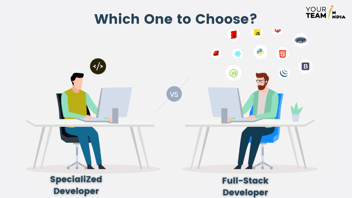Quick Summary: Highlighted some Advantages of Hiring full-stack developer. These benefits can include cost-effectiveness, versatility, faster project completion, streamlined communication, improved problem-solving, greater project ownership, the ability to work on multiple projects, better understanding of the entire development process, simplified project management, and improved quality of work.
Hey there, wait and imagine yourself in a situation. Think about being in a fancy restaurant, patiently waiting for your favorite dish only to find out that it wasn't what you thought it would be. After having that dish, you figured out that the restaurant had hired a chef who wasn’t skilled enough to prepare all dishes and cuisines.
Now imagine the same for software development. Think about having a software developer who specializes in only one aspect vs a software developer who can manage every stage of the development. You’ll choose the one who can manage multiple things, right? This is where a full-stack developer comes in! A full-stack developer has the skill and knowledge to handle each and every stage of the development process.
In this blog, we'll talk about the top 10 advantages of hiring a full-stack developer. We’ll also cover things that’ll signify that full-stack developers increase efficiency, help in better communication, and so on. And, by the end, you’ll be able to understand why having a full-stack developer on your team is like having the best full-course meal at your favorite restaurant. So, let's dig in!
Overview
Did you know that according to a survey conducted by Stack Overflow in 2020, Full-Stack Development was the most commonly used developer occupation worldwide?
This proves that companies worldwide are recognizing the importance of having a Full-Stack Developer on their team. But, what exactly is full-stack development? Let’s simplify this for you. Full-stack development is an end-to-end approach where a developer can efficiently handle both front-end and back-end development.
With their expertise and knowledge of different programming languages, frameworks, and tools they can seamlessly develop and maintain a complete web application. It’s like having a one-man army, capable of handling every aspect of development in your team.
So, if you're looking to hire a developer for your next project, a Full-Stack Developer might just be the missing piece you need for success.
Importance of full stack developers in modern web development:
Full-stack developers are becoming increasingly important in modern web development and companies have seen numerous advantages of hiring Full-Stack Developers. Some of the top importance are:
- Full-Stack Developers possess knowledge and expertise in both front-end and back-end development, making them versatile assets to any development team.
- Their problem-solving skills allow them to handle complex issues during development, ensuring smooth progress and efficient development.
- Full-Stack Developers are cost-effective as they have the capability to handle multiple tasks that would otherwise require separate specialists for each domain.
- They are seasoned in different programming languages, databases, frameworks, and tools, which adds to their efficiency to handle every aspect of web development end-to-end.
Now, that we've gone through the importance of having Full-Stack Developers, let's move on to explore the specific skills that make them such valuable assets.
Hire full stack developer from us to build a feature-rich market-fit product implementing the latest front-end and back-end technologies.
Four essential skills when Looking to Hire a Full-Stack Developer
- Look for their experience in front-end development. Specifically analyze if they are able to design the layout, create a compelling user interface, and write the code that makes a website easy to use. They should be accustomed to HTML, CSS, JavaScript, and various front-end frameworks.
- Secondly, check their back-end development arena. An ideal candidate should be able to write the server-side code that plugs a website. They should be skilled in back-end technologies like Node.js, Python, Ruby on Rails, and PHP.
- Another imperative skill to look for is their ability to handle database development. This is where their talent for designing, building, and maintaining databases that store website data will be tested. They should be well-versed in various database technologies like MySQL, MongoDB, and PostgreSQL.
- But, that’s not it. Technical skills aren't the only thing that matters. Soft skills are equally important. Your dream candidate should have excellent communication and collaboration skills and must be a great problem solver. Full-Stack Developers should also be able to work well in a team and see a project through from start to finish.
10 Advantages of Hiring a Full-Stack Developer
Now, let's move on to the most exciting part of this blog - the top 10 advantages of hiring a Full-Stack Developer. From saving costs to faster development times and better team collaboration, you'll discover how these experts can transform your web development process. So, kick back, relax, and get ready to see why a Full-Stack Developer is a valuable addition to your team.
1. Faster development:
A Full-Stack Developer can take care of multiple tasks and removes the need for multiple developers. This completes projects more quickly significantly reducing costs as compared to a team of specialized developers.
How Much Does it Cost to Hire a Full Stack Developer?
2. Holistic vision:
Full-Stack Developers have a complete perspective of the project and their awareness of the overall architecture and structure of the application results in better decision-making and problem-solving.
3. Enhanced collaboration:
Their efficiency to collaborate with team members, such as designers, project managers, and other developers helps them understand the requirements and constraints of different teams extremely easily while promoting effective teamwork.
4. Seamless user experience:
They have the skills to create websites and web applications that are visually appealing and also highly functional and easy to use. With a great UX, businesses can retain their customers and enhance their brand presence.
5. Better Control:
A Full Stack Developer bring along an extensive understanding of web development. They understand the user interface, and server-side logic and ensure consistent project quality. They can easily comprehend the project's requirements and can make changes without compromising integrity.
6. Responsive Agility:
Their ability makes them highly adaptable to changes which makes them the first choice for agile and fast-paced development environments. If you want developers for quick adaptation and rapid development, then full-stack developers are the right pick.
7. Universal problem-solving skills:
Full-stack developers have a huge set of skills and knowledge that helps them solve problems from different angles and perspectives. This enhances their aptitude to find solutions quickly, saving time and money.
8. Increased project control:
A full-stack developer in your team brings greater control over the project because they have the talent to monitor each aspect of the development.
9. Better scalability:
With growing companies, full-stack developers can build and manage a high volume of data and traffic efficiently without causing any scalability problems.
10. Higher innovation:
With their diversified skill set and broad knowledge, full-stack developers can create innovative solutions to any problem that comes their way. Their ability to work across multiple technologies and platforms brings a fresh perspective to a project.
This brings us to the end of the blog! We hope by now you’re convinced that a Full-Stack Developer is an outstanding addition to any team. Their technical and soft skills can take your web development projects to the next level. So, are you ready to use these advantages and make the most out of them?

Frequently Asked Questions (FAQs)
Is it better to hire a full-stack developer?
What are the pros and cons of full-stack development?
Cons include an overwhelming workload, limited expertise in certain technologies, and a potential lack of scalability as a team grows.







